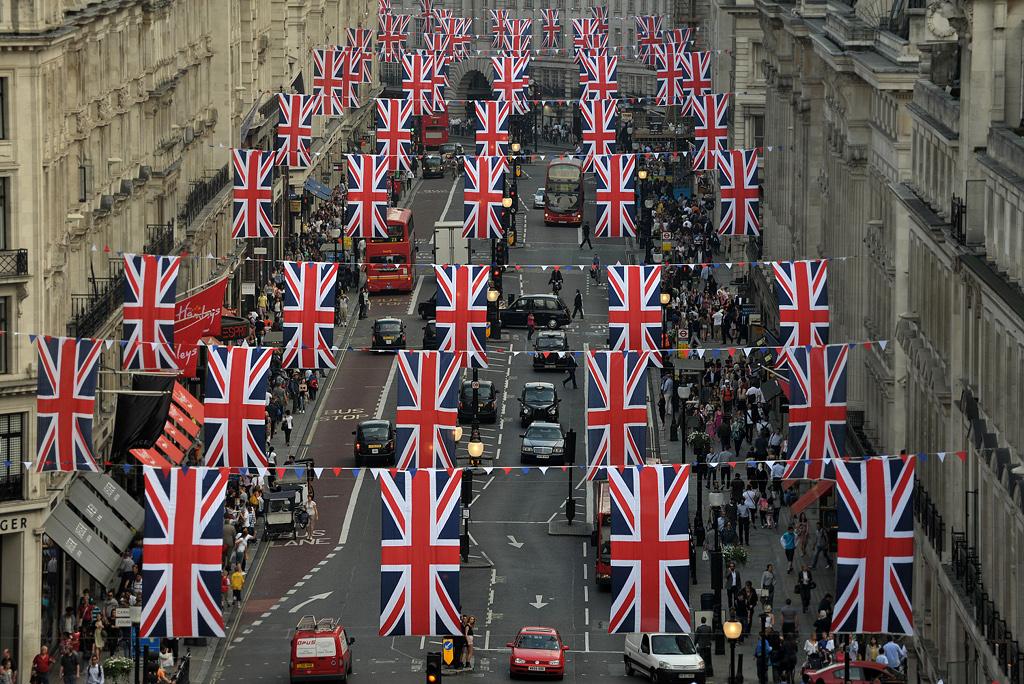British royal wedding: A match three decades in the making
The British Union Jack hangs over London’s Regent Street on April 20, 2011, in preparation for the wedding between Britain’s Prince William and Kate Middleton on April 29, 2011.
LONDON, United Kingdom — This is what they had in mind three decades ago. The heir to the throne's heir preparing to marry. London hung with bunting, a nation preparing to celebrate. The monarchy secure in the public's affections.
This is what the matchmakers who brought Prince Charles together with Lady Diana Spencer had in mind: a young beauty with a spotless reputation (i.e. a virgin) improving the bloodlines with her looks. And this is precisely what the managers of "The Firm" as Britain's royal family refer to themselves, got — except that, like in a sprawling 19th-century novel, the path toward fulfilling their wish has been wholly unexpected and tragic.
"There has been a turning of the circle over the last 20 years," said Martin Boon, of public opinion research firm ICM. "From before the death of Diana when there was a definitive mark down of support for the monarchy in poll findings to today when they are very popular again."
Diana hovers around the wedding of her son William to Kate (Catherine Elizabeth) Middleton. She is present in William's face and the way cameras love it. She is present in his body language in the one interview William and Kate have given in advance of the wedding: the way he looks down at his hands and slightly aslant at his beloved.
By example, Diana is part of this wedding. Everything the royal family did wrong in trying to force the late princess into their mold they have done right by allowing her son and his fiancee to find their own way to the altar.
"The Royal Family has kept up. They have learned to listen," said Boon. "Their survival is based on that."
The Queen, her family and her staff had a lot to learn. ICM polling from 1998, on the first anniversary of Diana's death, shows just how far their status had fallen. Almost half of Britons felt Diana's death had harmed the monarchy. One-third, a record number, said they did not expect Britain to have a monarchy in 50 years. The numbers continued to slide over the next few years.
Now the wheel has turned. Diana chafed against the isolation, the royal bubble. She rebelled against the idea that the monarchy had to be so distant from ordinary people. It's easy to mock, and many still do, her late night trips to visit battered women's shelters or AIDS wards. But if you have spoken to those who met her this way — with no cameras around, one to one — you learn that she was sincere.
Today's royal family has learned that lesson. They are more down to earth and in touch with ordinary folk. Kate Middleton's background is about as ordinary as can be. Her family runs a successful mail-order business in party paraphernalia.
Even as William and Kate's relationship has been revealed to the world by Britain's notorious tabloids there has been something ordinary about it. A couple of rich kids, graduates of top private schools, meet at an elite university. They date, live together, break up, get back together, pursue careers and, finally, decide to tie the knot. It happens all the time. Matchmakers were not involved, a phalanx of security police didn't close down the press, as happened when Charles was courting Diana.
So the rituals are underway. Flags are being hung around London. Various minor protest groups are ruffling people's sense of decency by demanding the right to demonstrate. The most royalist newspapers are decrying the cost of the wedding even as they urge their readers to throw a party and raise a glass to toast the happy couple. There is a kerfuffle over etiquette. Prime Minister David Cameron said he would wear a business suit to the wedding not a formal morning suit. The reasons were political. He did not want photos of himself looking posh. But he is posh, as he was reminded by all the Conservative supporting press. So now he will put on the tails.
Britons, in the midst of the most dramatic government austerity program since the great depression, seem happy to cheer on an event that demonstrates that there is still some "great" in Great Britain. They understand that their royal family has a global Q factor.
And, of course, advertisers are keen to use the royal wedding to promote their products.
There is also a reservoir of good will for William, the young man with his mother's face. At the time of her death, polling showed him to be enormously popular. Much more popular than his father, Charles. Last week, Charles became the longest serving heir to the throne. The Prince of Wales has been waiting for 59 years, two months and counting for his turn. With the Queen in spendid health that wait looks set to go on and on. Yet polls consistently show the public would like the crown to skip a generation and pass to William directly.
They are also more likely to believe he will have a chance to reign. "Today there is a more positive view that the monarchy will survive over the long term," said Boon. "When you ask the question whether there will still be a monarchy in a hundred years the response is at an all-time high."
Just what the royal matchmakers had in mind 30 years ago.
Every day, reporters and producers at The World are hard at work bringing you human-centered news from across the globe. But we can’t do it without you. We need your support to ensure we can continue this work for another year.
Make a gift today, and you’ll help us unlock a matching gift of $67,000!
